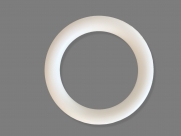Three-month Dapivirine Ring
Fast facts
- Acts against: HIV-1
- Delivery method: Silicone elastomer vaginal ring
- Active ingredient: Dapivirine, an ARV
- Length of action: Three months
- Status: One Phase I trial completed
Why is the three-month dapivirine ring important?
Current HIV prevention methods are used at the time of sex or daily, with a monthly version of the dapivirine vaginal ring on the horizon. An even longer-acting dapivirine ring that could be used for three months at a time would further expand women’s options, offer greater convenience and reduce overall costs.
How does the three-month dapivirine ring work?
The ring is made of a flexible silicone matrix polymer and contains dapivirine, an ARV that is slowly released over the course of three months. Women would insert the ring into the vagina themselves and replace it every three months.
What is its development history?
Using our monthly dapivirine ring as a platform technology, IPM began developing the 3-month dapivirine ring in 2014.
What is its clinical history?
MTN-036/IPM 047 was a Phase I randomized trial assessing the safety and pharmacokinetics of long-acting vaginal rings containing different amounts of dapivirine when used for approximately three months in 48 healthy, HIV-uninfected women ages 18-45 who are not pregnant in the United States. Participants were randomly assigned to one of three groups: one group used a vaginal ring designed for three-month use that contained 100 mg dapivirine; one group used a ring also designed for three-month use that contained 200 mg dapivirine; and for comparison, one group used the one-month ring containing 25 mg dapivirine.
Results announced in 2021 found that all three rings were well-tolerated and that the three-month rings achieved higher dapivirine levels in blood and vaginal fluid compared to the one-month ring.
What are the next steps for the three-month dapivirine ring?
IPM is planning a bioavailability study to further assess the three-month formulations. IPM will consider results from that study and from the completed Phase I trial will help determine next steps for the product to select a formulation to advance. IPM hopes to submit the first regulatory applications for the three-month dapivirine ring in 2023.
Who is IPM currently partnering with to develop and test the ring?
- ARV license: Janssen Sciences Ireland Unlimited Company
- Development: Queen's University Belfast
- Manufacturing: Sever Pharma Solutions (formerly QPharma)
- Clinical trial: Microbicide Trials Network
Where can I learn more?
- Our lead ARVs: Dapivirine
- Results from MTN-036/IPM 047: MTN press release
- Scientific publications
